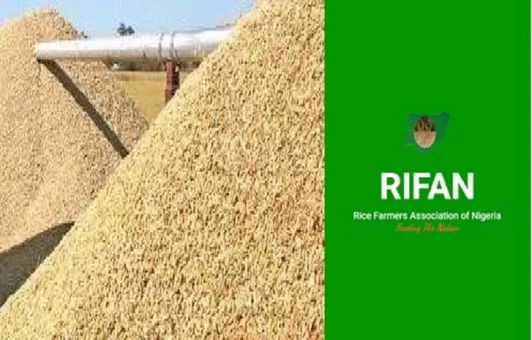Tags
Time to prepare for the rice revolution

By Abdu Abdullahi
Sir: The national treasurer of Rice Farmers Association of Nigeria ( RIFAN), Sadiq Daware has provided a diagnostic basis for the inevitable rice revolution in Nigeria with his estimation of over 12 million rice farmers cultivating an average of 0.5 hectare for two or three farming cycles annually, with an average output of four metric tonnes per hectare.
To go beyond this impressive statistics, the revolutionary side is converting the figures to improvements in outputs, mass participation, sophisticated innovations, and massive investments by both the government and private sector for Nigeria’s economic development.
We should draw inspiration from China, India and Indonesia, the largest producers of rice in the world. We ought to learn how the rice revolution tremendously impacted on these countries with amazing performance in rice production. This has made rice to be one of the most important staple crops in Asia and Africa. In Nigeria, for instance, rice is consumed across all geo-political zones and socioeconomic classes.
However, only about 57% of the 6.7 million metric tonnes of rice consumed annually is locally produced, leading to a supply deficit of about three million metric tonnes. Nevertheless, the rice market is expected to show a volume growth of 8.8% growth in 2025.
As we battle with economic conundrum related to oil, the need for economic diversification is long overdue and severally advocated, only to end at the periphery of endless discussion without any tangible outcomes. We are endowed with the fertile land for intensive and extensive agricultural activities. The northern Nigeria in particular serves as a potential zone for the rice revolution.
Our rice revolution can make its debut in the effective management of land fertility, vastness, capital and labour, which can be harnessed to enhance our food security and improve the scope of the economy.
The rice revolution can take different approaches and dimensions. But a particular and result-oriented scheme of rice farming that creates large scale production is the System of Rice Intensification (SRI), an approach developed by Fr. Henri de Laulanie in Madagascar in 1983.
The SRI is evidence based, doubling yields. A small holder farmer in northern India, Sumat Kumar, used SRI to produce 22.4 tonnes of rice from a single hectare in 2012, breaking the world record. When SRI is adopted as a revolutionary strategy for rice production, it takes into consideration, the local conditions and requirements based on four interacting principles: early, quick and healthy plant establishment; reduced plant density; improved soil conditions through enrichment with organic matter; reduced and controlled water application.
The SRI methods have been used in 47 countries and the overall results are impressive, 40% increase in yields, 40% reduction in cost, 23% reduction in water use, 68% increase in household incomes. Therefore, the proper application of the SRI provides a farming template for the success of the rice revolution in Nigeria.
Undoubtedly, the rice revolution can create employment opportunities, increase production and consumption, reduce the level of poverty, ensure food security and save Nigeria foreign exchange.
Interestingly, the rice revolution which began in tropical Asia (i.e. South and Southeast Asia) more than a half-century ago had resulted in dramatic increase in rice production in 1970s and 1980s.
For us in Nigeria, it is time to transcend the failed ‘Operation Feed the Nation’ and the ‘Green Revolution’. It is time for the authentic revolution to feed the nation at affordable prices.
Of course, we know of big challenges confronting our efforts in rice production such as the change in climate, resource scarcity, exerting pressure on our capacity. Nevertheless, collaboration between the federal and state governments can serve as a panacea to food insecurity and climate change affecting rice production.
The rice revolution is a deep temptation which should not be allowed to collapse. When actualised, we would be proud to be counted as one of the leading countries in rice production.
https://thenationonlineng.net/time-to-prepare-for-the-rice-revolution/Published Date: November 18, 2024






